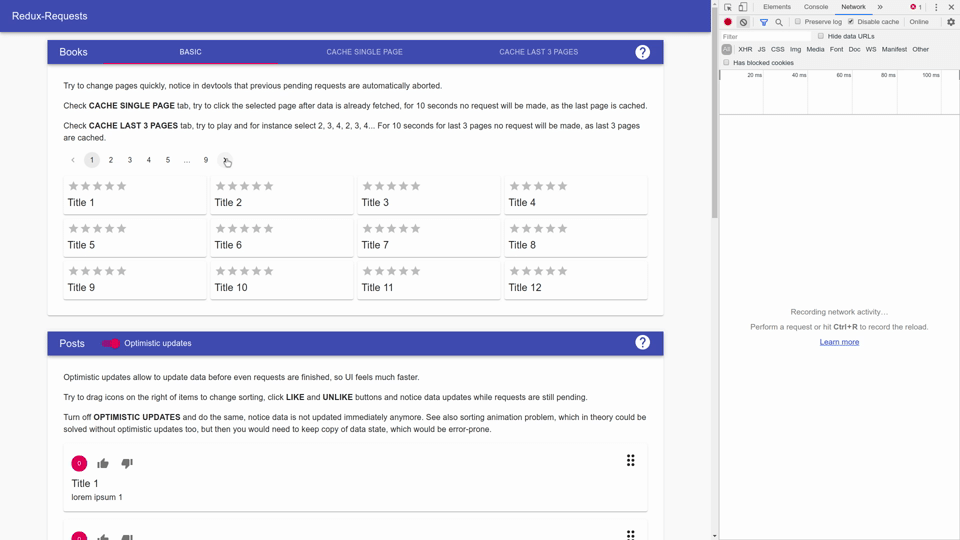Declarative AJAX requests and automatic network state management for single-page applications
Note
If you use other feching libraries, like
react-query, note, that one of the biggest advantage ofredux-requestsis an automatic normalisation and data updates. If you mostly care about this feature, you might also try to look at normy - a library to add this feature to any data fetching library!
Motivation ⬆️
With redux-requests, assuming you use axios (you could use it with anything else too!) you could refactor a code in the following way:
import axios from 'axios';
- import thunk from 'redux-thunk';
+ import { handleRequests } from '@redux-requests/core';
+ import { createDriver } from '@redux-requests/axios'; // or another driver
const FETCH_BOOKS = 'FETCH_BOOKS';
- const FETCH_BOOKS_SUCCESS = 'FETCH_BOOKS_SUCCESS';
- const FETCH_BOOKS_ERROR = 'FETCH_BOOKS_ERROR';
-
- const fetchBooksRequest = () => ({ type: FETCH_BOOKS });
- const fetchBooksSuccess = data => ({ type: FETCH_BOOKS_SUCCESS, data });
- const fetchBooksError = error => ({ type: FETCH_BOOKS_ERROR, error });
- const fetchBooks = () => dispatch => {
- dispatch(fetchBooksRequest());
-
- return axios.get('/books').then(response => {
- dispatch(fetchBooksSuccess(response.data));
- return response;
- }).catch(error => {
- dispatch(fetchBooksError(error));
- throw error;
- });
- }
+ const fetchBooks = () => ({
+ type: FETCH_BOOKS,
+ request: {
+ url: '/books',
+ // you can put here other Axios config attributes, like method, data, headers etc.
+ },
+ });
- const defaultState = {
- data: null,
- pending: 0, // number of pending FETCH_BOOKS requests
- error: null,
- };
-
- const booksReducer = (state = defaultState, action) => {
- switch (action.type) {
- case FETCH_BOOKS:
- return { ...defaultState, pending: state.pending + 1 };
- case FETCH_BOOKS_SUCCESS:
- return { ...defaultState, data: action.data, pending: state.pending - 1 };
- case FETCH_BOOKS_ERROR:
- return { ...defaultState, error: action.error, pending: state.pending - 1 };
- default:
- return state;
- }
- };
const configureStore = () => {
+ const { requestsReducer, requestsMiddleware } = handleRequests({
+ driver: createDriver(axios),
+ });
+
const reducers = combineReducers({
- books: booksReducer,
+ requests: requestsReducer,
});
const store = createStore(
reducers,
- applyMiddleware(thunk),
+ applyMiddleware(...requestsMiddleware),
);
return store;
};Features ⬆️
Just dispatch actions and enjoy automatic AJAX requests and network state management
Automatic and configurable requests aborts, which increases performance and prevents race condition bugs before they even happen
Compatible with anything for server communication. Axios, Fetch API, GraphQL, promise libraries, mocking? No problem! You can also integrate it with other ways by writing a custom driver!
Define multiple requests in single action
Update remote data before receiving server response to improve perceived performance
Cache server response forever or for a defined time period to decrease amount of network calls
Use automatic data normalisation in GraphQL Apollo fashion, but for anything, including REST!
Configure SSR totally on Redux level and write truly universal code between client and server
Use react bindings to decrease code amount with React even more
It has many utilities to make Typescript experience even greater, for example all data generics are inferred in selectors and dispatch results automatically.
Installation ⬆️
To install the package, just run:
$ npm install @redux-requests/core
or you can just use CDN: https://unpkg.com/@redux-requests/core.
Also, you need to install a driver:
-
if you use Axios, install
axiosand@redux-requests/axios:$ npm install axios @redux-requests/axiosor CDN:
https://unpkg.com/@redux-requests/axios. -
if you use Fetch API, install
isomorphic-fetch(or a different Fetch polyfill) and@redux-requests/fetch:$ npm install isomorphic-fetch redux-requests/fetchor CDN:
https://unpkg.com/@redux-requests/fetch.
Also, you have to install reselect, which probably you use anyway.
Usage ⬆️
For usage, see documentation
Examples ⬆️
I highly recommend to try examples how this package could be used in real applications. You could play with those demos and see what actions are being sent with redux-devtools.
There are following examples currently:
- basic
- advanced
- mutations
- normalisation
- Fetch API
- GraphQL
- actions-creator
- mock-and-multiple-drivers
- server-side-rendering
- suspense-ssr
- promise driver
- showcase
Companion libraries ⬆️
- redux-smart-actions - Redux addon to create actions and thunks with minimum boilerplate, you can use it to create requests actions faster and in a less verbose way, without constants, useful especially to create thunks without constants, so you have access to Redux state in request actions without any need to pass them with action arguments
Licence ⬆️
MIT















